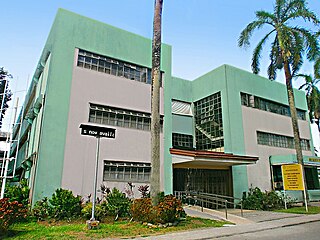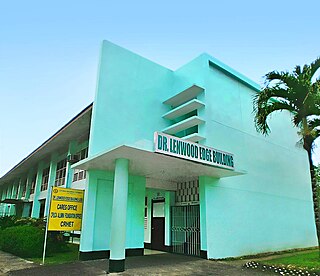
The Convention of Philippine Baptist Churches is a Baptist Christian denomination churches union, affiliated with the Baptist World Alliance, in Philippines. Headquartered in Jaro, Iloilo City, Philippines, it was founded in 1900 as the first and oldest organized Baptist churches union in the Philippine islands when the Philippines was opened to Protestant missions after the succession of the Philippines by Spain to the United States in 1898.

Iloilo City, officially the City of Iloilo, is a 1st class highly urbanized city in the Western Visayas region of the Philippines. It is the capital city of the province of Iloilo where it is geographically situated and grouped under the Philippine Statistics Authority, but remains politically independent in terms of government and administration. In addition, it is the center of the Iloilo-Guimaras Metropolitan Area, as well as the regional center and primate city of the Western Visayas region. In the 2020 census, Iloilo City had a population of 457,626 inhabitants, with a 0.42% population annual growth rate. For the metropolitan area, the total population is 1,109,649 inhabitants.

The Central Philippine University is a private research university in Iloilo City, Philippines. Established in 1905 through a benevolent grant of the American industrialist and philanthropist, John D. Rockefeller, as the Jaro Industrial School and Bible School under the auspices of the American Baptist Foreign Mission Society, it is the first Baptist founded and second American and Protestant university in the Philippines and in Asia. In 1913, women were first admitted to the school and it was later converted into a junior college in 1923 as Central Philippine School and as Central Philippine College in 1924. In 1953, the college attained university status.

West Visayas State University is a public normal research university located in La Paz, Iloilo City, Western Visayas region of the Philippines. It was established in 1924 as Iloilo Normal School under the tutelage of the Thomasites, but dates back its founding in 1902 as a part of Philippine normal school system with Iloilo National High School established by the American colonial government. It later became West Visayas State College in 1965 and acquired its university status becoming West Visayas State University in 1986.

Jaro, officially the District of Jaro, is one and the largest of all the seven districts of Iloilo City, in the province of Iloilo, on the island of Panay, in the Western Visayas region of the Philippines. Once a separate city, it merged when Iloilo City was re-incorporated in the 1940s during the American administration in the Philippines. Jaro is the largest of all the seven districts comprising the City of Iloilo. The Iloilo City district of La Paz and the present municipalities of Leganes and Pavia, adjoined as historical parts of Jaro before they became independent.

The PHINMA – University of Iloilo is a private university in Iloilo City, Philippines.

The Chinese General Hospital Colleges is a medical university located in Manila, Philippines. It was established in 1921 as the Chinese General Hospital School of Nursing (CGHSN). It is owned and managed by the Philippine Chinese Charitable Association (PCCA) Inc., as a non-profit service organization. In 2012, The College began to offer courses such as Bachelor of Science in Medical Technology, BS in Psychology, BS in Radiologic Technology and Diploma in Midwifery. In 2017, it opened the College of Medicine, which incorporates Traditional Chinese Medicine in its curriculum.

Trinity University of Asia, also known as TUA or simply Trinity, is a non-sectarian private university located in Quezon City, Philippines. Formally established in 1963 as an elementary, high school and collegiate educational institution by the Protestant Episcopalians, it dates back its earliest establishment in 1907 when the Trinity University of Asia - St. Luke's College of Nursing, its oldest organic academic unit, was established under the St. Luke's Hospital, the present day St. Luke's Medical Center. It later acquired its university status on July 18, 2006.
The history of nursing in the Philippines stems from the caregiving provided by women, priests, and herb doctors during precolonial Philippines. Even though women did not have much opportunity to be formally educated in schools because only a limited number of Filipino women received primary education in charitable institutions established by Spaniards, this trend continued during the Spanish colonial era. During the Philippine revolution, Filipino women also became the providers of care for wounded revolutionaries. During the American period in the Philippines, Filipino women were given the chance to become educated as nurses, guided by their American nurse and missionary mentors, until nursing became a full-pledged profession in the Philippines, a professional career not only for modern-day women in the country but also for men in the Philippines.

The Iloilo Mission Hospital, commonly referred to as Mission Hospital, Mission, CPU–IMH or IMH, is a private tertiary, academic and teaching hospital located in Jaro, Iloilo City, Philippines. Established in 1901 through the auspices of the Presbyterian Foreign Mission Board from the United States by the American missionary doctor, Joseph Andrew Hall, it is the "first and oldest American and Protestant founded hospital in the Philippines". It was originally named as Sabine Haines Memorial Union Mission Hospital in memory of Charles Haines's son, a New Yorker whose grant made possible for the founding of the hospital.

The Central Philippine University College of Medicine, also referred to as CPU COM, CPU College of Medicine, CPU ColMed or CPU Medicine, is the medical school of Central Philippine University, a private university in Iloilo City, Philippines. Established in 2002 and opened in 2003 with its first dean, Dr. Glenn A. M. Catedral, it is one of the youngest colleges and academic units of the university.
Central Philippine University Junior High School, also referred to as CPU Junior High School or CPU JHS, is a private high school located in Jaro, Iloilo City, Philippines, constituting as one of the academic units of Central Philippine University.

The Central Philippine University Church, commonly referred as University Church, UC or CPU Church, is a Protestant church located on the campus of the Central Philippine University in Jaro District, Iloilo City, Philippines. Founded in 1913 by the missionaries under the auspices of the American Baptist Foreign Mission Society, the present church structure was built and completed in 1970 under the chaplaincy of Kenneth Losh, an American Baptist missionary. The church which is notable for its Malay architectural style, is a famous landmark in Iloilo City.

The Central Philippine University College of Engineering, also referred to as CPU COE, CPU College of Engineering or CPU Engineering, is one of the academic units of Central Philippine University, a private university in Iloilo City, Philippines. Founded in 1936 during the American presidency of Central, Harland F. Stuart, it is one of the oldest engineering schools in the Philippines founded by the Americans. It later changed its status to a full college when Central Philippine College became a university in 1953.

The Central Philippine University College of Theology, also referred to as the CPU COT, CPU College of Theology or CPU Theology, is the theological seminary and one of the academic units of Central Philippine University, a private university in Iloilo City, Philippines. Founded in 1905 as the Bible School for the training of men Christian workers and missionaries through a grant of the American industrialist and Northern Baptist, John D. Rockefeller, it is the oldest college and academic unit of Central Philippine University and the first and oldest Baptist theological seminary in the Philippines.

Oscar "Richard" Serag Garin, Jr. is a Filipino civil engineer and politician. He is the son of Oscar Garin, Sr and Ninfa Serag Garin. He is the older brother of Sharon and Christine Garin.

The Central Philippine University College of Business and Accountancy, also referred to as CPU CBA, CPU College of Business and Accountancy or CPU Business and Accountancy, is one of the academic units of Central Philippine University, a private university in Iloilo City, Philippines. Founded in 1935 as the College of Commerce, it is one of the leading business schools in the country on the national performance of accountancy, real estate and civil service board exams; designations; accreditations; and notable alumni it produces.

The Central Philippine University College of Agriculture, Resources and Environmental Sciences, also referred to as CPU CARES or CPU Agriculture, is one of the academic units of Central Philippine University, a private university in Iloilo City, Philippines. Founded in 1951 by the American Agriculturist Burl Alba Slocum as the CPU College of Agriculture, it is the first agricultural school established outside of Luzon, and one of the leading schools of agriculture in the Philippines.

The Central Philippine University College of Computer Studies, also referred to as CPU CCS, CPU College of Computer Studies or CPU Computer Studies, is one of the an academic units of Central Philippine University, a private university in Iloilo City, Philippines. Founded as a department under the Central Philippine University - College of Business and Accountancy in 1995 and a separate college in 2003, the college confers four undergraduate degrees and one graduate degree. CPU College of Computer Studies has been accredited Level II by Philippine Accrediting Association of Schools, Colleges and Universities (PAASCU) in the academic programs of Computer Science, Information Systems, and Information Technology.























